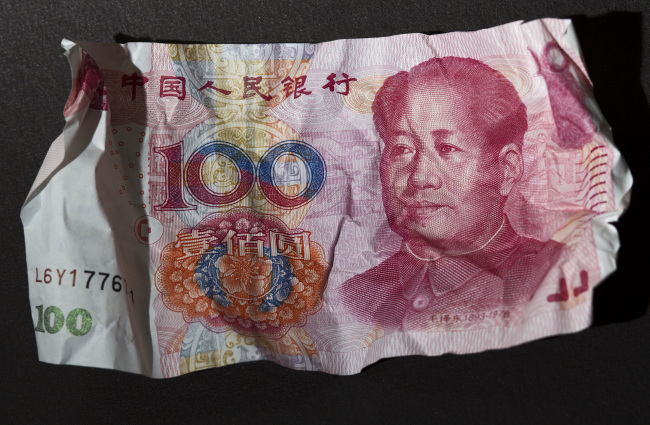Even as China’s recovery gathers momentum, growing risks in the financial sector are casting a shadow on its economic stability ― a key priority for the incoming leadership.
Since last month, a spate of at least five defaults on investment products sold to Chinese savers have sparked fresh fears about the fast-growing but largely unregulated informal lending sector.
Such wealth management products are a murky part of the so-called “shadow banking sector,” along with underground lenders and trusts which issue debt to higher-risk firms that cannot get access to regular bank loans.
Beijing is taking action to prevent a destabilizing fallout.
Since last month, a spate of at least five defaults on investment products sold to Chinese savers have sparked fresh fears about the fast-growing but largely unregulated informal lending sector.
Such wealth management products are a murky part of the so-called “shadow banking sector,” along with underground lenders and trusts which issue debt to higher-risk firms that cannot get access to regular bank loans.
Beijing is taking action to prevent a destabilizing fallout.

The central bank last week ordered all banks to provide detailed reports within 30 days about every wealth management product they have sold.
The Finance Ministry has also banned all local governments from illegally raising funds through trusts and wealth management products.
These are necessary moves, say observers, pointing out that the local authorities ― whose debt had hit 10.7 trillion yuan ($1.7 trillion) by the end of 2010 ― have tried to raise funds through such shadow banking channels to finance infrastructure projects. Such actions boost China’s gross domestic product but are not always cost-effective.
Some governments reportedly have had to roll over debts due to tight cash flow and corruption, so restricting them from raising funds in this way could hit China’s growth this year.
“They could lead to a liquidity tightening for local governments and, hence, a slowdown in local governments’ investment,” noted UBS economist Wang Tao.
But that may be a small price to pay to prevent the burgeoning risks of China’s shadow banking sector from destabilizing the whole system if defaults spike.
Scholars like Peking University professor Huang Yiping have even questioned if it could lead to “China’s version of the (United States’) subprime debt crisis.”
So more analysts are urging further reforms to make banks’ lending decisions and interest rates more market-oriented. “The huge risks faced by China’s wealth management products cannot simply be resolved through one round of checks,” argued Chinese Academy of Social Sciences professor Yi Xianrong. “The root of the matter lies in reforming the financial system.”
China sets its interest rates on deposits at artificially low levels, so state banking giants can lend at favorable rates to state-owned enterprises. Private businesses, starved of credit, resort to borrowing from underground lenders at sky-high rates.
This has helped the shadow banking sector to nearly double in the past two years to 25.6 trillion yuan, or more than a third of total lending, Barclays analysts estimated.
Meanwhile, savers are seeking higher-yield products to park their cash. Enter wealth management products. Sold by banks as alternatives to time deposits, they dangle rates too good to be true. Take one product offer reported last week by The Beijing News: Invest 1 million yuan for a week and get a 3.5 percent return. It would take a year to earn this amount of interest on a time deposit.
Such products do not give details of what they are invested in. But typically, they are structured from high-risk loans to entities from property developers to steel producers and even music concert organizers that would not qualify for a formal bank loan.
The assets and liabilities are booked off the balance sheet so banks would not be seen to flout risk regulations.
Not surprisingly, such products took off in a big way. Sales soared 48 percent last year to 13 trillion yuan, said ratings agency Fitch. This was up from about 7 trillion yuan in 2010, according to research firm Benefit Wealth.
But things started unraveling when state-owned Hua Xia Bank’s Shanghai branch failed to pay interest of up to 13 percent to customers who invested 140 million yuan, after its product reached maturity.
In October, Bank of China chairman Xiao Gang warned about wealth management products being “fundamentally a Ponzi scheme.”
What analysts now fear is that a string of defaults could spark turmoil among depositors.
One case ― albeit a small one - has already taken place. Villagers from southern Yancheng city panicked when told they would not get their money back on a product sold by some rural co-operatives.
They rushed to withdraw all their bank savings for fear of more defaults, forcing one co-op to limit withdrawals to 60,000 yuan a day to prevent a bank run.
“The biggest problem with this mess is the impact on banks’ reputation and trust,” said University of International Business and Economics professor Gao Jie.
By Grace Ng
(The Straits Times)
-
Articles by Korea Herald




![[Herald Interview] 'Amid aging population, Korea to invite more young professionals from overseas'](http://res.heraldm.com/phpwas/restmb_idxmake.php?idx=644&simg=/content/image/2024/04/24/20240424050844_0.jpg&u=20240424200058)












![[KH Explains] Korean shipbuilding stocks rally: Real growth or bubble?](http://res.heraldm.com/phpwas/restmb_idxmake.php?idx=652&simg=/content/image/2024/04/25/20240425050656_0.jpg&u=)

